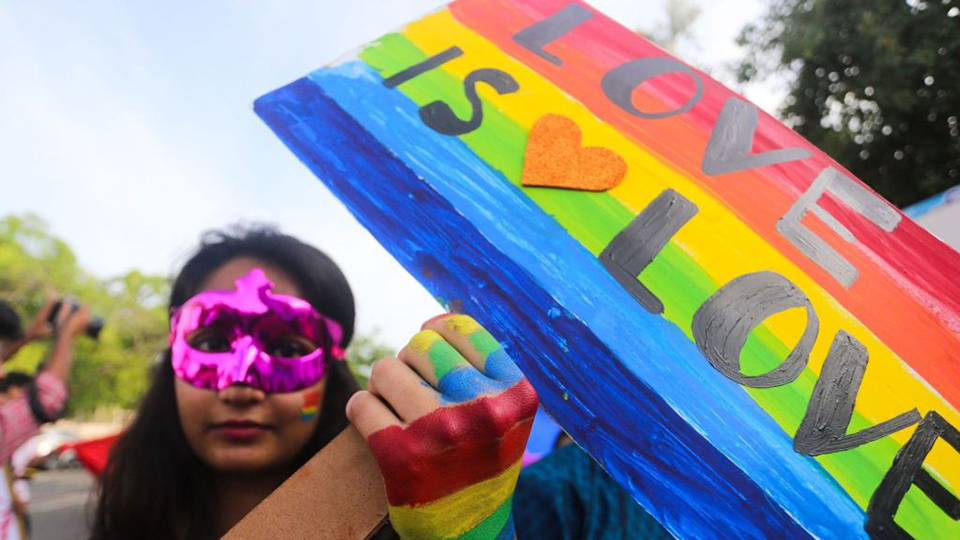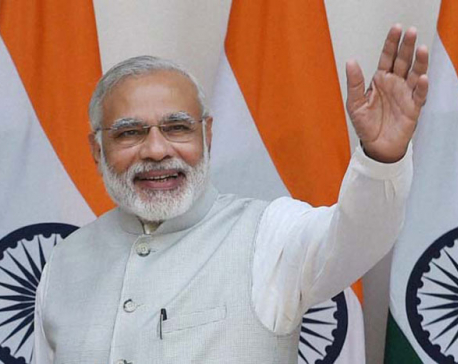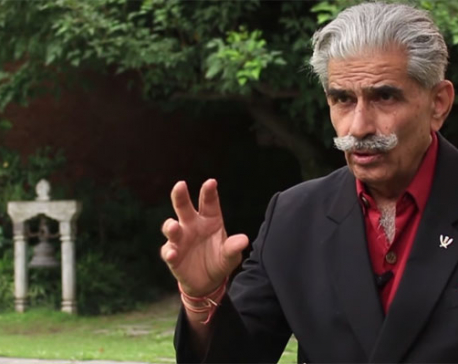
OR
“History owes an apology”: The key quotes from India’s landmark ruling on gay rights
Published On: September 7, 2018 03:00 PM NPT

NEW DELHI, Sept 7: The supreme court of India rewrote history on Sept. 06.
It scrapped section 377 of the Indian constitution, a colonial-era law banning gay sex, ending the social pariah status of the lesbian, gay, bisexual, transgender, and queer (LGBTQ) community in the world’s largest democracy.
The five judges—chief justice Dipak Misra and justices DY Chandrachud, AM Khanwilkar, Indu Malhotra, and Rohinton Fali Nariman—issued four separate but concurrent judgments to seal the matter, ending a decades-long battle.
Besides the impact the judgment is expected to have on Indian society, it is also being hailed for its deep philosophical, political, and literary underpinning. The judges generously borrowed ideas from sources as varied as William Shakespeare and Johann Wolfgang von Goethe to emphasise the importance of individual choice and legal equality.
Here are some crucial excerpts:
On individuality
Not for nothing, the great German thinker, Johann Wolfgang von Goethe, had said, “I am what I am, so take me as I am.”…The emphasis on the unique being of an individual is the salt of his/her life. Denial of self-expression is inviting death. Irreplaceability of individuality and identity is grant of respect to self. This realisation is one’s signature and self-determined design. One defines oneself. That is the glorious form of individuality.
—Chief justice Dipak Misra (for himself and Ajay Manikrao Khanwilkar)
On standing up for a minority
The court, as the final arbiter of the constitution, has to keep in view the necessities of the needy and the weaker sections. The role of the court assumes further importance when the class or community whose rights are in question are those who have been the object of humiliation, discrimination, separation and violence by not only the state and the society at large but also at the hands of their very own family members. The development of law cannot be a mute spectator to the struggle for the realisation and attainment of the rights of such members of the society.
—Justice Misra (for himself and Khanwilkar)
The mere fact that the LGBT persons constitute a “miniscule fraction” of the country’s population cannot be a ground to deprive them of their fundamental rights…Even though the LGBT constitute a sexual minority, members of the LGBT community are citizens of this country who are equally entitled to the enforcement of their fundamental rights…
—Justice Indu Malhotra
On keeping up with the times
In the contemporary world where even marriage is now not equated to procreation of children, the question that would arise is whether homosexuality and carnal intercourse between consenting adults of opposite sex can be tagged as “against the order of nature.” It is the freedom of choice of two consenting adults to perform sex for procreation or otherwise and if their choice is that of the latter, it cannot be said to be against the order of nature. Therefore, sex, if performed differently, as per the choice of the consenting adults, does not per se make it against the order of nature
—Justice Misra (for himself and Khanwilkar)
On fighting discrimination
…we are inclined to believe that if section 377 remains in its present form in the statute book, it will allow the harassment and exploitation of the LGBT community to prevail. We must make it clear that freedom of choice cannot be scuttled or abridged on the threat of criminal prosecution and made paraplegic on the mercurial stance of majoritarian perception.
—Justice Misra (for himself and Khanwilkar)
On transgender rights
The very existence of section 377 IPC criminalising transgenders casts a great stigma on an already oppressed and discriminated class of people. This stigma, oppression, and prejudice has to be eradicated and the transgenders have to progress from their narrow claustrophobic spaces of mere survival in hiding with their isolation and fears to enjoying the richness of living out of the shadows with full realization of their potential and equal opportunities in all walks of life. The ideals and objectives enshrined in our benevolent Constitution can be achieved only when each and every individual is empowered and enabled to participate in the social mainstream and in the journey towards achieving equality in all spheres, equality of opportunities in all walks of life, equal freedoms and rights and, above all, equitable justice. This can be achieved only by inclusion of all and exclusion of none from the mainstream.
-Justice Misra (for himself and Khanwilkar)
On social attitudes
The stereotypes fostered by section 377 have an impact on how other individuals and non-state institutions treat the community. While this behaviour is not sanctioned by Section 377, the existence of the provision nonetheless facilitates it by perpetuating homophobic attitudes and making it almost impossible for victims of abuse to access justice. Thus, the social effects of such a provision, even when it is enforced with zeal, is to sanction verbal harassment, familial fear, restricted access to public spaces, and the lack of safe spaces. This results in a denial of the self. Identities are obliterated, denying the entitlement to equal participation and dignity under the Constitution. Section 377 deprives them of an equal citizenship.
– Justice Dhananjaya Y Chandrachud
On sexual health
The operation of Section 377 denies consenting adults the full realization of their right to health, as well as their sexual rights. It forces consensual sex between adults into a realm of fear and shame, as persons who engage in anal and oral intercourse risk criminal sanctions if they seek health advice. This lowers the standard of health enjoyed by them and particularly by members of sexual and gender minorities, in relation to the rest of society.
-Justice Chandrachud
Last but not the least
History owes an apology to the members of this community and their families, for the delay in providing redressal for the ignominy and ostracism that they have suffered through the centuries. The members of this community were compelled to live a life full of fear of reprisal and persecution. This was on account of the ignorance of the majority to recognise that homosexuality is a completely natural condition, part of a range of human sexuality…
-Justice Malhotra
You May Like This

Nepal good friend of India: Deuba, India ready to support Nepal's development: Modi
NEW DELHI, Aug 24: Prime Minister Sher Bahadur Deuba, who is currently on a five-day state visit of India, said... Read More...

China outrunning India in Nepali politics, India mulling a new strategy
With an unprecedented activeness of China, India seems preparing to counter it. India's Nepal Affairs expert and retired Indian Army... Read More...

Indian cricketers wear army camouflage caps as patriotism grips country
NEW DELHI, March 8: Indian cricketers wore army camouflage-style caps in a match with Australia on Friday in solidarity with... Read More...





Just In
- CM Kandel requests Finance Minister Pun to put Karnali province in priority in upcoming budget
- Australia reduces TR visa age limit and duration as it implements stricter regulations for foreign students
- Govt aims to surpass Rs 10 trillion GDP mark in next five years
- Govt appoints 77 Liaison Officers for mountain climbing management for spring season
- EC decides to permit public vehicles to operate freely on day of by-election
- Fugitive arrested after 26 years
- Indian Potash Ltd secures contract to bring 30,000 tons of urea within 107 days
- CAN adds four players to squad for T20 series against West Indies 'A'













Leave A Comment